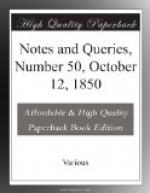“Whereas many mischiefs and dangerous accidents, tending not onely to the highest breach of the peace, but also to the destruction of the lives of his Ma’ties subjects, have happend and been occasioned by Footmen wearing of Swords, for the prevention of the like evill accidents and disturbance for the future, I doe hereby order that no Foot-man attending any of the Nobilitye or Gentry of his Ma’ties Realms, during such time as they or any of them shall reside or bee within the Cities of London or Westm’r, and the Liberties and Precincts of the same, shall wear any Sword, Hanger, Bagonet, or other such like offensive weapon, as they will answer the Contempt hereof.” Dated 30th Dec. 1701.
F.E.
Speech given to Man to conceal his Thoughts (Vol. i., p. 83.).—The maxim quoted by your correspondent F.R.A. was invented, if I may rely upon the notebook of memory, by the Florentine Machiavelli. The German writer Ludwig Boerne says:—
“Macchiavelli, der die Freiheit liebte, schrieb seinem Prinzen so, dass er alle rechtschaffenen Psychologen in Verlegenheit und in solche Verwirrung gebracht, dass sie gar nicht mehr wussten, was sie sprachen und sie behaupteten, Macchiavelli habe eine politische Satyre geschrieben.”
Le style c’est l’homme!
JANUS DOUSA.
The Character “&,”, and Meaning of “Parse" (Vol. ii., pp. 230. 284.).—This character, being different from any of the twenty-four letters, was placed at the end of the alphabet, and children, after repeating their letters, were taught to indicate this symbol as and-per-se-and. Instead of spelling the word and, as composed of three letters, it was denoted by a special symbol, which was “and by itself, and.” Hence the corruption, an ampussy and.
The word parse is also derived from the Latin per se. To parse a sentence is to take the words per se, and to explain their grammatical form and etymology.
L.
Wife of Edward the Outlaw (Vol. ii., p. 279.).—With reference to the Query of E.H.Y. (Vol. ii., p. 279.), there seems to be much confusion in all the accounts of Edward’s marriage. I think it is evident, from an attentive consideration of the various authorities, that the Lady Agatha was {319} either sister to Giselle, wife of Stephen, King of Hungary (to whom the young princes must have been sent, as he reigned from A.D. 1000 till A.D. 1038), and sister also to the Emperor Henry II., or, as some writers seem to think, she was the daughter of Bruno, that emperor’s brother. (See a note in Dr. Lingard’s History, vol. i. p. 349.)




